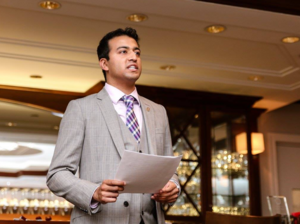
D.C.’s Rose Health, a fast-growing mental health startup that quickly gained traction through the Covid-19 crisis, has been acquired by a West Coast behavioral health company for an undisclosed amount.
The local startup, whose digital platform identifies symptoms of depression and mood disorders and connects patients with care, has sold to Westlake Village, California’s Precise Behavioral Inc., the companies have told us.
Precise, a new company, comes from Dr. Nitin Nanda, founder and CEO of behavioral health platform Aligned Telehealth, which he sold to Boston’s Amwell in 2019. It’s also backed by Deepak Chopra, founder and CEO of Hawthorne, California-based electronics manufacturing company Osi Systems Inc., and Kapil Nanda, founder and former chief of Los Gatos, California-based IT consulting firm Infogain Corp., which sold in 2021 to British private equity firm Apax Partners LLP.
“We will be able to deliver patient care services to those who previously may have gone undetected or had limited access,” Nanda said in a statement.
The deal combines Rose’s technology with Precise’s network of psychiatric providers — giving the D.C. company greater support for the patients using its platform, deeper industry connections, a broader network of potential customers and access to funding that means it shouldn’t have to raise any institutional capital going forward, Rose founder and CEO Kavi Misri said in an interview.
“We’re about to grow exponentially and we need the help for operations,” Misri said. “Now we’re bringing seasoned folks on that can really help us and guide us.”
The growth opportunity
Under the agreement, Rose Health maintains its District headquarters and brand as a subsidiary of Precise Behavioral. Misri will continue serving in the top slot for Rose, while becoming the combined company’s chief innovation officer and joining its board of directors. Nanda serves as CEO of Precise Behavioral and Cory Thomas — former chief operating officer of Lewisville, Texas-based behavioral health management company Horizon Health Corp., part of King of Prussia, Pennsylvania’s Universal Health Services Inc. (UHS) — has been appointed chief financial officer of Precise.
Rose’s top priority is widely commercializing its platform, which runs patient self-assessments and journal entries through a language processing algorithm to detect through semantic tone whether the person is experiencing depression, anxiety, or issues with health, relationships or finances, for instance. Rose then creates a score — green (mild), yellow (moderate) or red (severe) — to inform whether the patient should turn to the Rose app for self-care and coping mechanisms, or connect directly with the company’s care team, which is available 24/7.
Rose already counts about 50 physician groups as customers, and more recently shifted its strategy to focus on contracts with accountable care organizations. Now, Misri said, the company is also going after health plans, health systems, federal agencies and employers as target customers. So Rose is adding sales executives and operations employees “that can help us unleash the full potential of our contracts,” Misri said.
Rose also intends to move deeper into the mental health space. It already serves patients experiencing depression, anxiety, trauma, ADHD, insomnia and pain — and, starting in 2023, would look to add dementia and cognitive decay, traumatic brain injury, bipolar disorder and schizophrenia to that list, Misri said.
The market for digital mental health tools has exploded through the pandemic, which drove demand for mental health care and accelerated adoption of telemedicine. What sets Rose apart from other players in this space, Misri said, is it’s backed by clinical research. The company completed an Institutional Review Board study in its infancy and tested the platform’s efficacy — important, Misri said, to ensure “that we’re releasing something that actually has an impact versus releasing something that is just hype.”
The combined company declined to disclose revenue projections, but said the business expects to serve a few million patients by the end of next year. Rose has thus far served thousands of patients through testing phases and early contracts, according to Misri.
The next steps
Rose brings 25 employees and Precise brings “less than 100,” Misri said of the combined company’s headcount. He expects to add another 100 people, including psychiatrists, to the Rose business by the end of the year. The platform also recently added 15 daily live classes, from meditation to stress management to pain management, now with 10 contracted instructors and a goal to reach about 100, Misri said.
Rose is now focusing on enhancing its tech platform by using video to analyze microfacial expressions and recognize pain or symptoms of substance abuse, for example. It’s separately running a six-month pilot for a version of its platform for kids and adolescents, and in the early stages of developing a tool for the aging population as part of an AARP accelerator program.
Misri, a WBJ 40 Under 40 honoree, has taken Rose, one of our 2021 Startups to Watch, through Johns Hopkins University’s Social Innovation Lab, Johns Hopkins Medicine’s Hexcite medical software accelerator and the Georgetown incubator from Halcyon, which is also an investor in the company.
“Kavi’s passion for the topic goes beyond building this company to caring about changing people’s perception of mental health care,” Halcyon co-founder and CEO Kate Goodall said in an email to the Washington Business Journal. “This acquisition will allow that vision to be realized at the scale we’ve always wanted and thought possible.”
Rose has raised roughly $4 million in funding since launching at the end of 2019, and had paused a Series A round to instead pursue this acquisition, Misri said. Two investors — Robert Rothenberg, a real estate and tech investor, and Dr. John Shivdat, chairman and medical director of emergency medical services with HCA Healthcare’s Coliseum Medical Center — funded the business through due diligence to get to this point, he said.
Rose wasn’t originally looking for the exit, but received multiple M&A offers over the summer, Misri said. And Nanda, one of Rose’s investors, was building out Precise Behavioral around that time. Then they decided to start working toward this acquisition — which, Misri said, given Nanda’s experience, “would be the best opportunity for Rose.”



